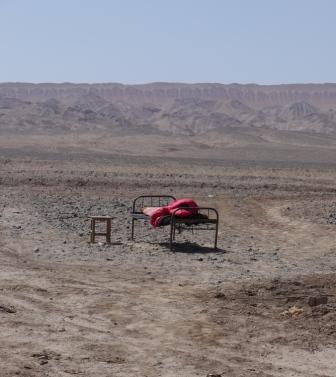
Sleeping under the stars. A common place sight in the western Gobi desert. But no sign of the table lamp…

I doubted if few coming this way even knew, let alone appreciated, that, across an unremarkable strip of tarmac, lay an imaginary line. Longitude. Ninety degrees east. One quarter of the way around the world. Taken almost a year. Actually, I’d gone a bit further than that, starting a little to the west of the Greenwich Meridian.
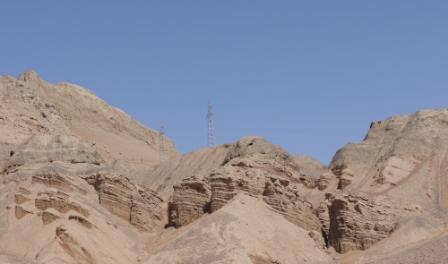
I’d left Turpan earlier in the day, descending for a while. Further into the Depression. Brief respite from the harsh sun at a truck stop. Already in the thirties. Check of the altimeter. One hundred and fifty four feet below sea level. Further east the road climbs steadily, either side sandstone cliffs replacing the rough, rocky scrub of the Turpan Basin.

The occasional strip of green, sometimes close, sometimes distant. Small settlements. Mud brick buildings. Inaccessible from the carriageway, a stout barbed wire fence either side. Not even the smallest of gaps.
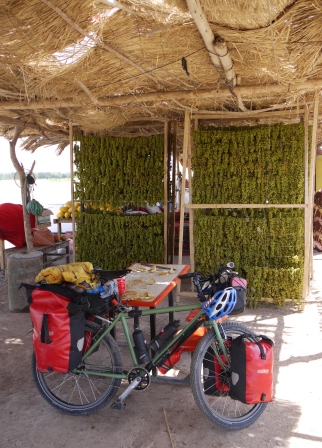
And then, eventually, a break in the fence. Across dusty, rough ground, a stall. Beneath the straw roof, tables stacked with melons, grapes drying on racks, a freezer filled with bottled water, a TV flickering in the background. Lunch. Then a return to the road. The earlier cliffs, imaginatively shaped by the wind, replaced by loose rocks, devoid of vegetation.
Later, beyond the ninetieth line of longitude, swirling dust clouds, whipping up debris as they crossed the carriageway. Further towards Shanshan, the night’s stop, thunder. Then huge globules of rain. Cold. But not the expected deluge. And not unpleasant.
If there’d been a flaw in the plan, it was the distance. Bit more than I’d anticipated. Quite a bit more. Around two hundred miles in a little over twenty four hours. I’d left Kyrgyzstan’s Capital Bishkek mid-afternoon, avoiding the full heat of the day, heading for the city of Almaty in eastern Kazakhstan. Slight delay at the border crossing. Refused to budge until the guards provided me with all the relevant stamps I’d need to be allowed to leave and cross into China.
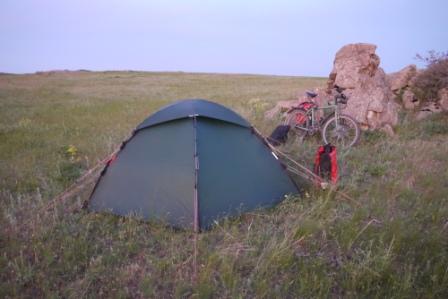
I’d chosen to tackle the worst of the climbs on the road to Almaty in the relative cool of the evening. As dusk approached, around nine in the evening, I’d pulled off the road along a small track across rolling moorland. Found a discrete pitch for the night. Up at six, back on the road before seven.
Within an hour or so I’d finished the last of the climbs, and made a rapid descent to the plains below that would lead me to Almaty. Stopped at a small roadside cafe, the first I’d seen for quite some distance. After a quick breakfast I’d joined the lorry drivers freshening up at an outside tap, attempting to remove some of the previous day’s grime and salty deposits.
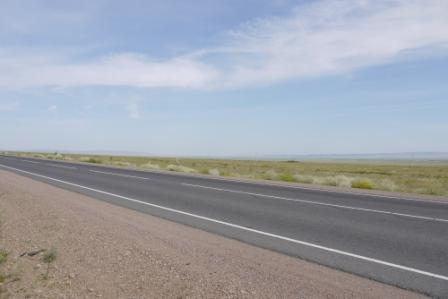
Then a steady grind eastwards, flat, barren steppe at first, more undulating later. Mile after mile. The odd cafe, small settlement with a few market stalls besides the road, perhaps a shop, to break up the monotony. And to replenish fluids.
Reaching Almaty around five, the evening rush hour traffic was quite bearable, the railway station rendezvous with my host for the next few days remarkably straightforward to find. I’d been my choice, largely because it appeared on my maps, but was on the opposite side of the city to where I’d be staying. The longest day. So far.
When I’d originally decided to cross much of the Kazakh steppe by train, I’d toyed with continuing on beyond Kyzylorda, disembarking much closer to Bishkek. But I’d wanted to experience desert conditions, an environment I’d never cycled in before. Put the theory I’d been taught into practice. Develop and refine skills I’d need quite a bit before the expedition was over. Box ticked in spades. And I was really glad I’d done it. Learnt an awful lot.
The revised plan? Overnight train from Turkistan to the small town of Lugovoy, about thirty miles from the Kyrgyz Republic border. Puts me back on track. Practical necessity I tell myself. And it is, but it still niggles because I know that, but for visa constraints, I could ride the whole way. In the grand scheme of things I’m sure none of this really matters, accepted practice for long-haul touring cyclists. But I’ve never been very good at acquiescing just because others do.
So, I found myself back at a railway station, this time in Turkistan. Ainur had, once again, very kindly offered to help, taking me to the station late on Sunday evening to make the arrangements. How close to the border could I get? Where did the Bishkek train now stop? All sorted. Eventually. Arrived in town less than eight hours earlier. You never know quite how each day’s going to play out.
Turkistan. At last. Two hundred miles south of Kyzylorda across the inhospitable Kazakh steppe. I’d stopped briefly at a small cafe on the outskirts, seeking directions for the centre. Found a mobile phone pressed into my hand, an English speaking female voice at the other end. Wasn’t exactly sure who the woman was, but explained what I was doing, adding I’d been given a sketch map to help me find somewhere to stay.
After the emptiness of the steppe, a mele of sights and sounds in Turkistan. Vehicles stopping suddenly, forcing others to weave erratically around them. Scant regard for traffic lights. Pedestrians wandering aimlessly across the road, unperturbed by the traffic. Alluring aromas from roadside cafes and market stalls.
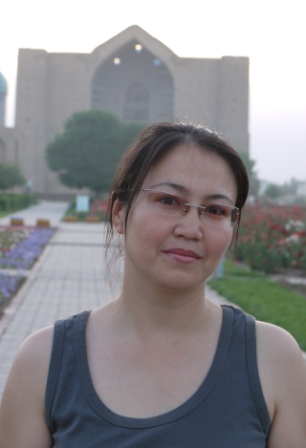
I drifted around for a while, soaking up a little civilisation. Then off to find somewhere to stay. Chancing on a hotel mentioned in my guide book, I’d suspected it’d be outside my budget but thought I’d enquire in any case. Barely reached the reception desk when a young woman arrived, addressing me in English. Ainur explained that it was she I’d spoken to earlier in the cafe her mother ran. She’d guessed where I might go and had come to help. Which she did admirably. Got an ensuite room for the price of a basic single. About fifteen pounds for a night. Came with air conditioning. And Emma could join me.
All that would have been generosity enough. But no. Returning to the lobby after dinner, I met Ainur once more, quite unexpectedly. She was keen to show me something of her home town. The Mausoleum of the first popular Turkic Muslim holy man, Kozha Akhmed Yasaui, built in the fourteenth century. Beautiful rose gardens.

On the train from Atyrau to Kyzylorda there was invariably a wait for the squat toilet at the end of the carriage. But not for the Western style porcelain affair at the other end. I seemed to be the only user, discretely placing a small tear in the roll of unusually soft toilet paper to see if anyone else made use of it. It appeared not.
Squat toilets aren’t anything new on this expedition, commonplace in France and again in the old Eastern Bloc countries, Turkey and the Caucasus. Definitely never been my first choice of lavatory, so why their popularity? I suspect the answer is the very reason, ironically, I’m not a huge fan. Hygiene. Except for where you put your feet, no contact with where someone else has been before you. Provided you can cope with the squatting position, anatomically probably quite good, doesn’t sound such a bad idea. Except that some designs are susceptible to being blocked by paper, so you have to pop that in an adjacent bin.
Out in the villages, in more remote places, it’s the pit toilet. Same idea as the squat type, but without the water flush. Filling, if the guide books are to be believed, Western travellers with absolute dread, especially in hot climates. Bit harsh? I think so. For one thing, local people have used them for centuries, and I don’t suppose the old outside toilet down the end of an English garden was that much more attractive. No, like most things, some are truly terrible, many are not. Just like the Western style ones.
And what, you may ask, is a decent pit toilet? A stone built building helps keep the inside cool, less fragrant. Small windows, without glass, also help the air inside from getting stuffy, especially in hot climates. And, if all is working properly, natural biological processes render human waste relatively odourless. Which means no dropping paper into the pit. That normally goes into a metal receptacle for burning.
At the cafe from Ken Roberts on Vimeo.
Ken describes proper adventure in the Kazakh steppe, and a night in a small family run roadside cafe. And admire the only trees for miles.

I’d ridden hard from Zhangaqorghan towards the town of Turkistan, anxious to make as much ground to the south as I could in the relative cool of the evening. I’d intended to stop around nine and discretely pitch my tent away from the road, but instead came across a small settlement. Gave me an idea. A homestay. Usually very inexpensive, and a great way to experience village life. But had to be quick. Would soon be dark.
Asking around, I was directed to a small family run roadside cafe. In a mixture of broken Kazakh and Russian, I explained I’d hoped to reach Turkistan that night, but it was now too late. Could I sleep here? Yes. It seemed I could. And Emma could spend the night in the porch. The usual fascination with my map and phrase book over, I was beckoned to the water pump in the yard to remove the worst of the salty grime I’d accumulated. Then a generous bowl of mutton soup, a roll mat, pillow and duvet. Bed at last. Not bad for about five pounds.
In the Kazakhstan steppe from Ken Roberts on Vimeo.
Ken describes riding across the Kazakh steppe in ferocious temperatures.
Shade. I lay prostrate against the sloping concrete supports of a small bridge, exhausted. Five in the afternoon, temperature still in the thirties in the Kazakhstan Steppe. Contemplating the road to Bishkek, how best to deal with such fierce, draining heat. A wide brimmed sun hat and sunblock provide a modicum of protection. Settlements are infrequent, sometimes thirty or forty kilometres apart, the odd petrol station, but sufficient to replenish with water. And frequent donations from passing motorists.
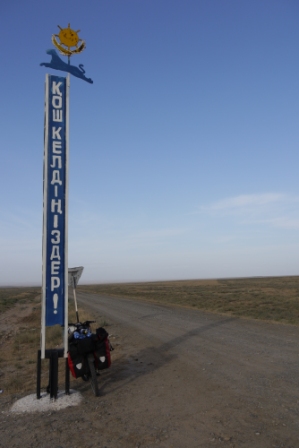
Nothing moves during the middle of the day. Except the traffic on the main road south, and even that seems lighter. Livestock, goats and cattle mostly, the sheep content to wander, vie for shelter in the occasional concrete bus shelter. Lorries parked up, their drivers lying beneath their trailers. Temperature in the high thirties. The air tastes hot.
Attempt to ride much after eleven in the morning, and again before four or five in the afternoon, and progress is barely worth the effort. A few kilometres at a stretch, then the struggle to find shelter, to cool down. And, despite the odd passing vehicle, so very lonely, the landscape barren, arid, inhospitable. The elements harsh, unforgiving.
I’d found myself stopping in small family run cafes, flaked out across chairs or benches, sleeping, like many of the local people, during the hottest part of the day. Given generous bowls of mutton soup to revive me, payment refused. Every sinew of meat devoured. And small gifts of local chocolate to take with me, surprisingly resilient to the intense heat.
Water alone fails to satisfy. You crave cold fluids. With temperatures close to that of the body’s core, the cooling effect seems as vital as keeping properly hydrated. And the quantities you need to consume are quite staggering. Close on a litre an hour. Quite possible to down an entire bottle without pausing. Even the smallest village shops, often precious little on the shelves, have freezers brimming with a multitude of cool beverages. But not cold. Too much of a struggle for the refrigerators.
Driving south from Kyzylorda across the Steppe, progress on the first day had been a respectable eighty miles. But much of it achieved by riding late into the evening, pushing hard in the relative cool. But the next day, from Shieli towards the town of Turkistan, had been much tougher going, the road conditions generally poorer and the heat more intense. By five I’ve reached the outskirts of Zhangaqorghan, where I’d found some respite under the small bridge. Still almost fifty miles remaining to my intended stop in Turkistan.
Unsure what I’d find on the road ahead, I decided to stock up with more supplies and then continue on until dusk, before pitching my tent a discrete distance from the road. Rest, then back in the saddle at first light, riding hard until mid-morning, hoping by then to have reached Turkistan.